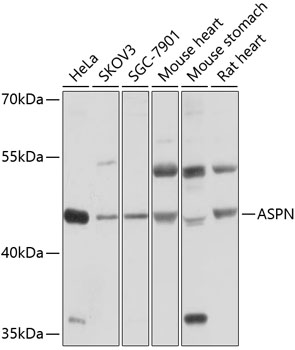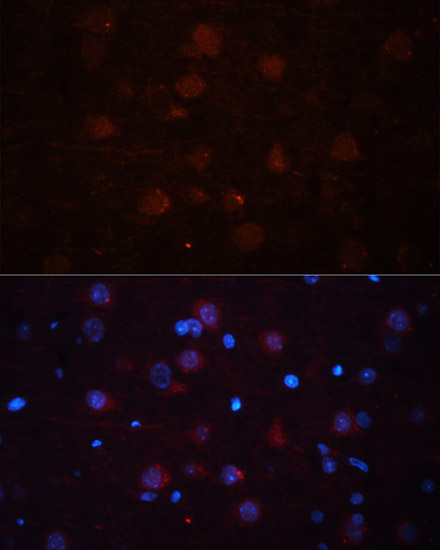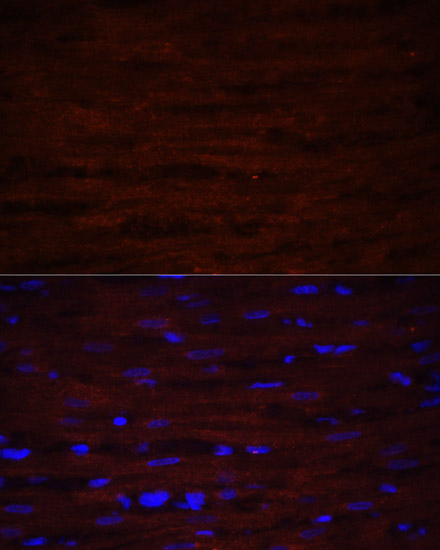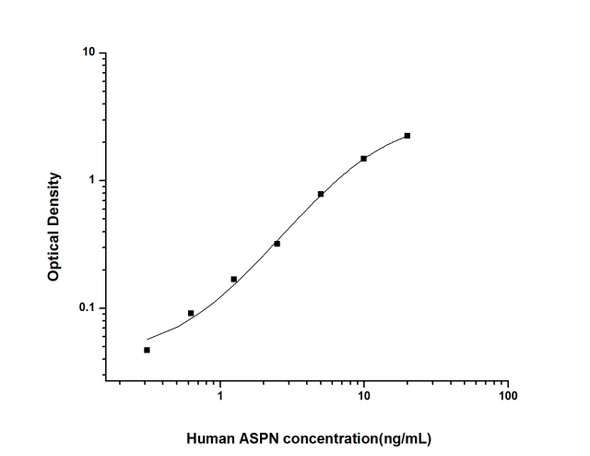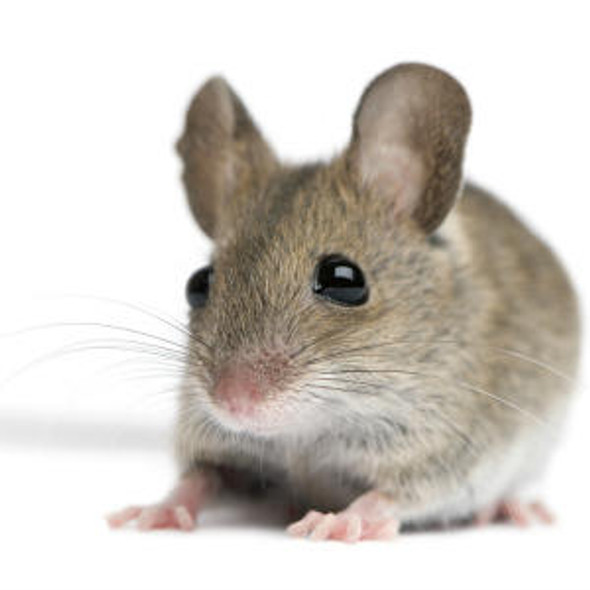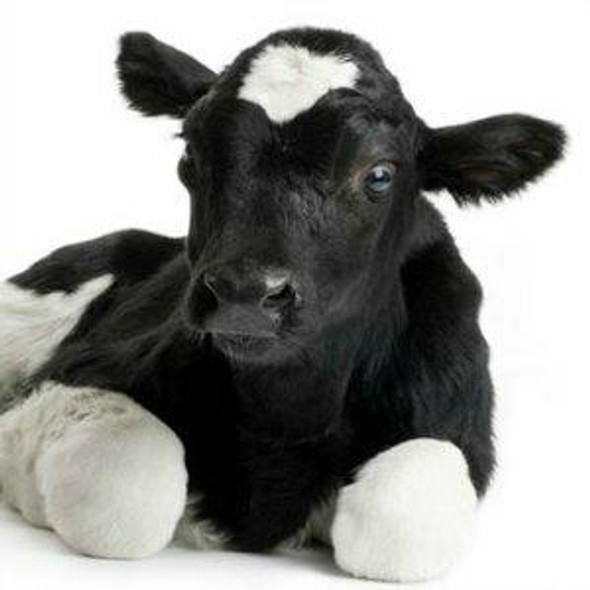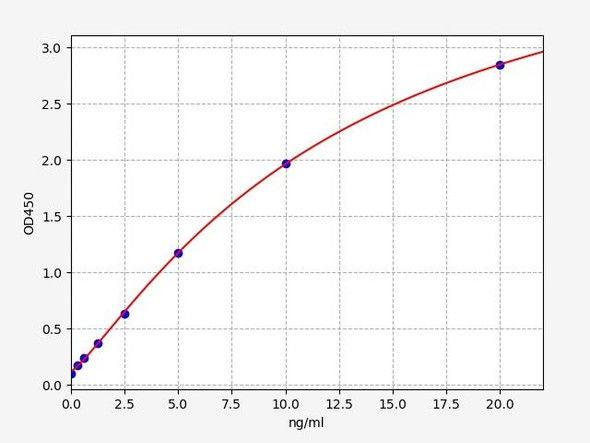Signal Transduction Antibodies 1
Anti-ASPN Antibody (CAB10311)
- SKU:
- CAB10311
- Product Type:
- Antibody
- Reactivity:
- Human
- Reactivity:
- Mouse
- Reactivity:
- Rat
- Host Species:
- Rabbit
- Isotype:
- IgG
- Antibody Type:
- Polyclonal Antibody
- Research Area:
- Signal Transduction
Description
| Antibody Name: | Anti-ASPN Antibody |
| Antibody SKU: | CAB10311 |
| Antibody Size: | 20uL, 50uL, 100uL |
| Application: | WB IF |
| Reactivity: | Human, Mouse, Rat |
| Host Species: | Rabbit |
| Immunogen: | Recombinant fusion protein containing a sequence corresponding to amino acids 100-379 of human ASPN (NP_060150.4). |
| Application: | WB IF |
| Recommended Dilution: | WB 1:500 - 1:2000 IF 1:50 - 1:200 |
| Reactivity: | Human, Mouse, Rat |
| Positive Samples: | HeLa, SKOV3, SGC-7901, Mouse heart, Mouse stomach, Rat heart |
| Immunogen: | Recombinant fusion protein containing a sequence corresponding to amino acids 100-379 of human ASPN (NP_060150.4). |
| Purification Method: | Affinity purification |
| Storage Buffer: | Store at -20'C. Avoid freeze / thaw cycles. Buffer: PBS with 0.02% sodium azide, 50% glycerol, pH7.3. |
| Isotype: | IgG |
| Sequence: | PFDT RMLD LQNN KIKE IKEN DFKG LTSL YGLI LNNN KLTK IHPK AFLT TKKL RRLY LSHN QLSE IPLN LPKS LAEL RIHE NKVK KIQK DTFK GMNA LHVL EMSA NPLD NNGI EPGA FEGV TVFH IRIA EAKL TSVP KGLP PTLL ELHL DYNK ISTV ELED FKRY KELQ RLGL GNNK ITDI ENGS LANI PRVR EIHL ENNK LKKI PSGL PELK YLQI IFLH SNSI ARVG VNDF CPTV PKMK KSLY SAIS LFNN PVKY WEMQ PATF RCVL SRMS VQLG NFGM |
| Gene ID: | 54829 |
| Uniprot: | Q9BXN1 |
| Cellular Location: | Secreted, extracellular matrix, extracellular space |
| Calculated MW: | 43kDa |
| Observed MW: | 43kDa |
| Synonyms: | ASPN, OS3, PLAP-1, PLAP1, SLRR1C, asporin |
| Background: | This gene encodes a cartilage extracellular protein that is member of the small leucine-rich proteoglycan family. The encoded protein may regulate chondrogenesis by inhibiting transforming growth factor-beta 1-induced gene expression in cartilage. This protein also binds collagen and calcium and may induce collagen mineralization. Polymorphisms in the aspartic acid repeat region of this gene are associated with a susceptibility to osteoarthritis, and also with intervertebral disc disease. Alternative splicing of this gene results in multiple transcript variants. |
| UniProt Protein Function: | ASPN: Negatively regulates periodontal ligament (PDL) differentiation and mineralization to ensure that the PDL is not ossified and to maintain homeostasis of the tooth-supporting system. Inhibits BMP2-induced cytodifferentiation of PDL cells by preventing its binding to BMPR1B/BMP type-1B receptor, resulting in inhibition of BMP-dependent activation of SMAD proteins. Critical regulator of TGF-beta in articular cartilage and plays an essential role in cartilage homeostasis and osteoarthritis (OA) pathogenesis. Negatively regulates chondrogenesis in the articular cartilage by blocking the TGF- beta/receptor interaction on the cell surface and inhibiting the canonical TGF-beta/Smad signal. Binds calcium and plays a role in osteoblast-driven collagen biomineralization activity. Genetic variations in ASPN are associated with susceptibility to osteoarthritis type 3 (OS3); also known as osteoarthritis of knee/hip. Osteoarthritis is a degenerative disease of the joints characterized by degradation of the hyaline articular cartilage and remodeling of the subchondral bone with sclerosis. Clinical symptoms include pain and joint stiffness often leading to significant disability and joint replacement. Susceptibility to osteoarthritis is conferred by a triplet repeat expansion polymorphism. ASPN allele having 14 aspartic acid repeats in the N-terminal region of the protein (D14), is overrepresented relative to the common allele having 13 aspartic acid repeats (D13). The frequency of the D14 allele increases with disease severity. The D14 allele is also overrepresented in individuals with hip osteoarthritis. Defects in ASPN are a cause of susceptibility to intervertebral disk disease (IDD). A common musculo- skeletal disorder caused by degeneration of intervertebral disks of the lumbar spine. It results in low-back pain and unilateral leg pain. Susceptibility to intervertebral disk disease, particularly lumbar disk degeneration, is conferred by a triplet repeat expansion polymorphism. ASPN allele having 14 aspartic acid repeats in the N-terminal region of the protein (D14), is associated with the disorder in some populations (PubMed:18304494). Belongs to the small leucine-rich proteoglycan (SLRP) family. SLRP class I subfamily. |
| UniProt Protein Details: | Protein type:Extracellular matrix; Secreted; Secreted, signal peptide Chromosomal Location of Human Ortholog: 9q22.31 Cellular Component: cytoplasm; extracellular matrix; proteinaceous extracellular matrix Molecular Function:calcium ion binding; protein kinase inhibitor activity Biological Process: bone mineralization; cytokine and chemokine mediated signaling pathway; negative regulation of JAK-STAT cascade; negative regulation of protein kinase activity; negative regulation of transforming growth factor beta receptor signaling pathway Disease: Intervertebral Disc Disease; Osteoarthritis Susceptibility 3 |
| NCBI Summary: | This gene encodes a cartilage extracellular protein that is member of the small leucine-rich proteoglycan family. The encoded protein may regulate chondrogenesis by inhibiting transforming growth factor-beta 1-induced gene expression in cartilage. This protein also binds collagen and calcium and may induce collagen mineralization. Polymorphisms in the aspartic acid repeat region of this gene are associated with a susceptibility to osteoarthritis, and also with intervertebral disc disease. Alternative splicing of this gene results in multiple transcript variants.[provided by RefSeq, Jul 2014] |
| UniProt Code: | Q9BXN1 |
| NCBI GenInfo Identifier: | 209572589 |
| NCBI Gene ID: | 54829 |
| NCBI Accession: | Q9BXN1.2 |
| UniProt Secondary Accession: | Q9BXN1,Q5TBF3, Q96K79, Q96LD0, Q9NXP3, |
| UniProt Related Accession: | Q9BXN1 |
| Molecular Weight: | 43kDa |
| NCBI Full Name: | Asporin |
| NCBI Synonym Full Names: | asporin |
| NCBI Official Symbol: | ASPN |
| NCBI Official Synonym Symbols: | OS3; PLAP1; PLAP-1; SLRR1C |
| NCBI Protein Information: | asporin |
| UniProt Protein Name: | Asporin |
| UniProt Synonym Protein Names: | Periodontal ligament-associated protein 1; PLAP-1 |
| Protein Family: | Asporin |
| UniProt Gene Name: | ASPN |
View AllClose


